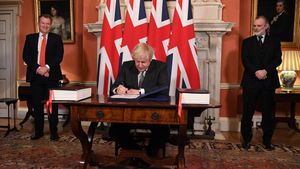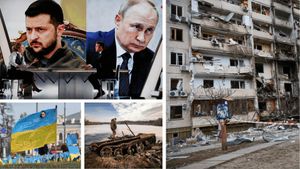With global security concerns intensifying and the war in Ukraine still raging, European leaders are gathering for the first-ever EU summit explicitly focused on defense. Scheduled to take place on Monday in Brussels, the meeting reflects Europe’s urgent need to bolster its military funding, especially as uncertainty looms over American support under President Donald Trump’s administration.
European Council President Antonio Costa is spearheading the event, which will see the participation of key figures, including British Prime Minister Keir Starmer and NATO Secretary General Mark Rutte. During the summit, leaders will seek to navigate how to finance their military needs amid rising tensions with Russia and the backdrop of Trump’s pledge to reassess U.S. military aid.
Since Russia's invasion of Ukraine three years ago, the call for increased defense spending has become increasingly urgent. Costa emphasized this sentiment by stating, "Europe needs to assume greater responsibility for its own defence." His remarks come at a time when European nations are on high alert, fearing potential shifts in U.S. foreign policy following Trump's promises of a swift resolution to the Ukraine conflict. Many European leaders worry this might lead to reduced American military support for Ukraine, putting immense pressure on Europe to shore up its own defenses.
Ahead of the summit, the collective response from 19 out of 27 EU member states, including heavyweights like France and Germany, has been notable. These nations signed a letter advocating for the European Investment Bank (EIB) to loosen its funding rules to increase financial resources for defense projects. The EIB, recognized as the world’s largest multilateral public lender, has already allocated billions to assist Ukraine since the onset of hostilities. According to the spokesperson for the EIB, there are plans to double funding allocations for security and defense projects to around two billion euros this year.
The discussion at this high-stakes summit won't merely center on immediate funding increases. The leaders will also explore longer-term defense capabilities and whether to raise the NATO spending target above the 2% of GDP benchmark established at previous summits. Costa noted, "There is a very reasonable consensus among member states to continue on this path," emphasizing the importance of improving air defense, anti-missile systems, and electronic warfare capabilities.
Trump's previous comments about NATO nations needing to fulfill their financial commitments by significantly increasing defense spending have added to the urgency felt across Europe. Currently, the United States allocates about 3.4% of its GDP to defense, but Trump has suggested NATO contributions could rise to 5%. This potential shift heightens concerns, making collaborative funding initiatives among EU nations more pressing.
Some European leaders advocate for joint EU borrowing to support defense spending, taking inspiration from the collective efforts made during the COVID-19 pandemic. Yet discussions about debt within the EU could complicate the existing obligations each member has under NATO, raising questions about how to balance those responsibilities effectively.
The meeting is particularly significant as it marks the first occasion since Brexit where British leadership joins the 27 EU nations to discuss defense collaboration. Starmer’s presence underlines the shifting dynamics of international alliances and the shared concern for security across Europe. The vibrant discourse highlights the potential for greater military collaboration and funding initiatives, positioning Europe to respond effectively to threats.
Among the noteworthy developments within EU defense strategies, Finland has announced the construction of a new TNT factory aimed at ramping up ammunition production. Valued at over €200 million, this project embodies Finland's commitment to supporting Ukraine and fortifying its defense capabilities. Finnish Defence Minister Antti Hakkanen remarked, "The project will enable Finland to continue its support for Ukraine in the long term." This step not only enhances Finland's military readiness but also contributes to overall European defense objectives.
While the path forward is fraught with challenges, the urgency for European leaders to unite and bolster their collective defense cannot be overstated. The growing recognition of the need for self-reliance amid potential changes to U.S. military commitments highlights the historic nature of this summit. It aims to chart a course for Europe’s defense strategy and reflects deep-seated realizations about the imperative for collaborative action.
With reflections of unity and shared purpose, this meeting between EU leaders serves as a pivotal moment for Europe's military future. The upcoming discussions present opportunities to reshape how Europe addresses security challenges and fortifies its defense frameworks, heralding a newfound sense of responsibility and determination.



